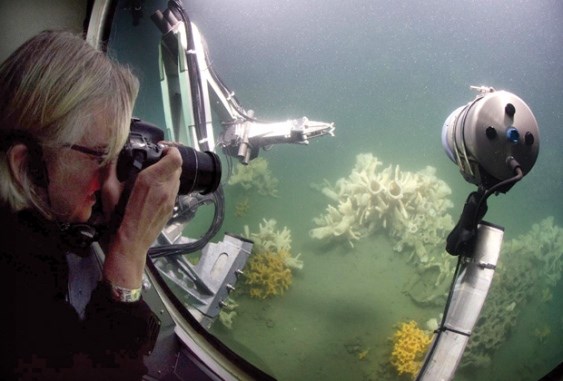Environmentalists are calling for more protection of delicate, endangered reefs on the floor of Howe Sound.
The Canadian Parks and Wilderness Society says the federal government needs to act on the recommendation of Ocean Wise Research Institute and restrict bottom-contact fishing near all glass sponge reefs in Howe Sound, which “remain vulnerable to mechanical damage and climate change.”
The “living dinosaurs” were thought to have gone extinct more than 37 million years ago but, small pockets of them have been turning up off the B.C. coast since the 1980s, including many in Howe Sound.
Glass sponges provide critical habitat for dozens of species including prawns and rockfish and they filter billions of litres of water per day. But they are as brittle as their namesake. A 2017 survey by the Fisheries and Oceans Canada and Marine Life Sanctuaries Society catalogued at least three Howe Sound glass sponge reefs that had been damaged by traps or fishing lines. The Ocean Wise report and other studies have also found them highly sensitive to warming water temperatures.
In 2019 the federal government banned prawn and crab traps, shrimp and groundfish trawls, groundfish hook and line, and the use of downrigger gear in eight areas off West Vancouver, Bowen Island, Gambier Island, Lions Bay, Anvil Island and the Defence Islands.
New reefs are continuing to be discovered faster than the federal government can enact rules to protect them, including five in Howe Sound confirmed by DFO last month.
“By removing the threat of bottom-contact fishing, glass sponges will be better able to adapt to a changing ocean,” said Ross Jameson, manager of CPAWS’ B.C. chapter. “We need the immediate designation of fishing closures for all of Howe Sound’s glass sponge reefs to protect these rare creatures for generations.”
West Vancouver-Sunshine Coast-Sea to Sky Country Liberal MP Patrick Weiler said he has already spoken with Fisheries Minister Bernadette Jordan about protecting the newly discovered reefs.
“I absolutely agree,” he said. “It's one of the things that makes Howe Sound unique.”
But, he cautioned, it's not as simple as “flipping a switch.”
“There's a whole number of stakeholders that need to be engaged in this - everything from the province to First Nations to commercial and recreational harvesters... Those processes take time,” he said. "But the importance of those areas is well recognized now.”



